|
|
|
Sort Order |
|
|
|
Items / Page
|
|
|
|
|
|
|
| Srl | Item |
| 1 |
ID:
190434
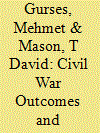

|
|
|
|
|
| Summary/Abstract |
While a growing body of research has highlighted a significant and positive relationship between negotiated peace agreements and postwar democratization, they have focused almost exclusively on a minimalist form of electoral democracy. We extend this analysis to consideration of how civil war outcomes affect egalitarian democracy, which measures the extent to which the regime incorporates (1) equal protection of rights and freedoms, (2) equal distribution of resources, and (3) equal access to power. We add V-Dem egalitarian democracy measures to the UCDP Conflict Termination dataset to determine whether civil war outcomes account for just the emergence of electoral democracy or whether they also affect the prospects for a more just and equitable society for citizens at the grassroots level. Our findings highlight the need to qualify the effect of modes of war termination on postwar democratization. Peace agreements are followed by higher levels of democratization than is the case with other civil war outcomes, but the effect on egalitarian democracy is more durable than the effect on electoral democracy.
|
|
|
|
|
|
|
|
|
|
|
|
|
|
|
|
| 2 |
ID:
113529


|
|
|
|
|
| Publication |
2012.
|
| Summary/Abstract |
Theories of environmental degradation as a predictor of armed conflict have gained momentum as scientists warn of the catastrophic consequences of global warming. Despite an increasing number of studies that emphasize this causal relationship, the literature is scant on the reverse linkage - environmental consequences of civil war. This study seeks to examine the impact of civil war on the environment and argues that state forces deliberately transform the environment to undermine rebels' ability to wage a war. Using data from the Kurdish conflict in Turkey, this study presents evidence for the devastating effects of civil war on deforestation and the agrarian economy.
|
|
|
|
|
|
|
|
|
|
|
|
|
|
|
|
| 3 |
ID:
173146


|
|
|
|
|
| Summary/Abstract |
Abstract: In a region undergoing dramatic changes, the Kurds in particular have begun to enjoy a political resurgence. Of those countries where Kurds reside, Turkey is the single most important actor for several reasons: It is a powerful state that is home to more than half of the total Kurdish population; it has been locked in a stalemate with (arguably) the most powerful Kurdish insurgent group, the Kurdistan Workers’ Party [Partiya Karkeren Kurdistan, PKK]; this decades-long armed conflict progressively has acquired a trans-border disposition and fomented disagreement between Turkey and the United States in Syria; and lastly, Turkey under the Justice and Development Party [Adalet ve Kalkinma Partisi, AKP] gradually is distancing itself from the Western bloc and moving away from democratic values and principles. This article examines the evolving Kurdish question in Turkey with an emphasis on how it is interacting with changing domestic, regional, and global dynamics.
|
|
|
|
|
|
|
|
|
|
|
|
|
|
|
|
| 4 |
ID:
101431


|
|
|
|
|
| Publication |
2010.
|
| Summary/Abstract |
Scholars have argued that the outbreak of civil wars destroys the possibilities for ethnic cooperation and conclude that the most effective remedy for ethnic civil conflict is to redraw national borders. Building upon the Kurdish conflict in Turkey, this article shows that peaceful coexistence after ethnic civil wars is possible as long as the state sufficiently democratizes by respecting the political and cultural rights of the ethnic group. These in-depth interviews with members of the Kurdish political elite, together with other informal conversations with dozens of people, show that, despite decades of conflict, the respondents do not deem ethnicity to be a primary obstacle against a peaceful coexistence.
|
|
|
|
|
|
|
|
|
|
|
|
|
|
|
|
| 5 |
ID:
184170


|
|
|
|
|
| Summary/Abstract |
Unlike various natural disasters that some studies have highlighted as potential contributors to peace, the threat posed by the COVID-19 pandemic is neither short-term nor regionally confined. Thus, rather than invoking a compassionate response, the pandemic is likely to aggravate pre-existing divisions and create an environment that accentuates survival over compassion. Building on a large probability survey data gathered in May 2020 in Turkey, we demonstrate that the pandemic has disproportionally affected minority Kurds and exacerbated pre-existing inequalities and social polarization. Results from a series of regression analyses show growing dissatisfaction with the Turkish government’s handling of the pandemic. However, this effect fails to translate into the sense of solidarity between majority Turks and minority Kurds necessary to build a peaceful society. Support for the government’s approach to the Kurdish opposition seems to be conditioned by social categorization and increasingly partisan political identities in Turkey.
|
|
|
|
|
|
|
|
|
|
|
|
|
|
|
|
| 6 |
ID:
096864
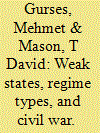

|
|
|
|
|
| Publication |
2010.
|
| Summary/Abstract |
A central theme in research on civil war and revolution is that 'weak states' are especially prone to civil war. Empirically, however, tests of this proposition have relied on proxy measures of state weakness such as GDP, mountainous terrain, and population, none of which directly measure features of the state itself. Earlier theoretical works point to particular regime types as being especially susceptible to civil war. We present a theoretical argument that delineates what regime types are more or less prone to civil war (and why) and test this theory with a series of logit models using Fearon and Laitin's and Sambanis' civil war data sets and Geddes' data classifying non-democratic regimes. The findings support earlier theoretical arguments that particular types of weak states - personalist or neopatrimonial regimes - are more prone to civil war onset than others.
|
|
|
|
|
|
|
|
|
|
|
|
|
|
|
|
| 7 |
ID:
084551
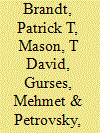

|
|
|
|
|
| Publication |
2008.
|
| Summary/Abstract |
Previous research has shown that the duration of a civil war is in part a function of how it ends: in government victory, rebel victory, or negotiated settlement. We present a model of how protagonists in a civil war choose to stop fighting. Hypotheses derived from this theory relate the duration of a civil war to its outcome as well as characteristics of the civil war and the civil war nation. Findings from a competing risk model reveal that the effects of predictors on duration vary according to whether the conflict ended in government victory, rebel victory, or negotiated settlement.
|
|
|
|
|
|
|
|
|
|
|
|
|
|
|
|
| 8 |
ID:
105236
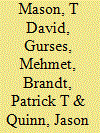

|
|
|
|
|
| Publication |
2011.
|
| Summary/Abstract |
We argue that the duration of the peace after civil wars is mainly a function of the extent to which the outcome of the previous civil war preserved a condition of multiple sovereignty and the extent to which the post-civil war environment creates incentives for dissident groups to resort to violence rather than sustain the peace. Hazard models suggest that the outcome of the previous conflict does affect the duration of the peace, and this effect varies across time. The introduction of peacekeeping forces has a substantial positive effect on peace duration. We also find evidence of a curvilinear relationship between ethnic fractionalization and post-civil war peace duration. Based on these results, we conclude with recommendations for how peace can be maintained after a civil war.
|
|
|
|
|
|
|
|
|
|
|
|
|
|
|
|
| 9 |
ID:
168797
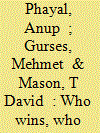

|
|
|
|
|
| Summary/Abstract |
Previous research has shown that the outcome of a civil war is related to conflict duration: military victory by either the government or the rebels occurs early if it occurs at all, and the longer a civil war lasts, the more likely it is to end in a negotiated settlement. The models of civil war duration and outcome that have produced these findings are built on characteristics of the civil war and less on attributes of the state itself, other than where the state lies on the Polity autocracy-democracy scale. We propose that how civil wars end varies not only between democracies and authoritarian regimes but among the different authoritarian regime types identified by Geddes, Wright, and Franz. The distinguishing attributes of these regime types—democracy, one-party, personalist, military, monarchical—should lead to different likelihood in defeating a rebel movement, being defeated by a rebel movement, and negotiating a peace agreement with a rebel movement. Results from a series of competing-risk models using the Uppsala–Peace Research Institute Oslo Armed Conflict Dataset demonstrate support for our claim that how civil wars end is partly a function of the characteristics of the regime.
|
|
|
|
|
|
|
|
|
|
|
|
|
|
|
|
| 10 |
ID:
172856
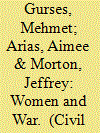

|
|
|
|
|
| Summary/Abstract |
To what extent do women’s rights change in a post-civil war society, and what explains these changes? To address these questions, a number of studies emphasise the disruptions to daily home, work, and community environments brought about by the dynamics of conflict. While war is disruptive and has the potential to generate new opportunities for women, we argue that conflict alone fails to explain variations in women’s rights. Using a cross-sectional dataset, we examine the insurgent group’s political ideology as a central explanatory factor for changes in women’s rights in the aftermath of civil war. Results from a series of regression analyses show that while wartime dynamics help improve women’s political rights, this is not necessarily the case when it comes to women’s economic and social rights. These results demonstrate the need to account for the insurgent group’s political ideology in examining the change to women’s rights in the context of armed conflict.
|
|
|
|
|
|
|
|
|
|
|
|
|
|
|
|
|
|
|
|
|